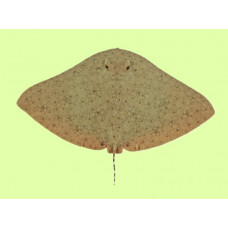Latin name
Gymnura australis
Other name
Butterfly Ray, rat-tail ray, rat-tailed ray, skate.
Identification
Gymnura: Greek, gymnos = naked + Greek, oura = tail.
The snout of the Australian butterfly ray is short and broad with a blunt tip. There are spatulae behind the eyes. On the ventral side of the disc is a rather large curved mouth, nostrils and 5 pairs of gill slits. There is a leathery flap between the nostrils. The teeth are small, narrow and pointed. There are dorsal and ventral ridges at the end of the caudal peduncle, and sometimes 1 or 2 spines at the base.
Features of fish fins
The pectoral fins are elongated in the form of broad 'wings', almost 1.5 times the length of the body. They merge into a diamond-shaped disc. The pelvic fins are small and rounded. The tail is filamentous. Caudal, anal and dorsal fins are absent.
Fish colouring
The colour of the dorsal surface of the disc is brownish with numerous dark and light spots.
Distribution
Widespread in the Indo-West Pacific: northern Australia and the southern coast of New Guinea, and the Arafura Sea.
Habitat
A tropical marine bottom dweller with a habitat depth range of 250 to 150 metres.
Size
Maximum length of males of this species is 94 cm. Maximum reported weight: 7.4 kg.
Behavior
Occurs from coast to shelf on the continental shelf in open sandy, muddy and silty habitats, including estuaries and intertidal areas.
Food and feeding habits
It feeds mainly on bony fish.
Reproduction
Possess the ability to lay eggs (aplacental viviparity), in which the embryos are initially nourished by the egg yolk and then receive additional nutrition from the mother by indirect absorption of uterine fluid enriched with mucus, fat or protein through specialised structures. They mature at a diameter of 35-42 cm (males) and 44-46 cm (females). Juveniles are 22 to 25 centimetres long. There are 1 to 6 cubs in a litter.
Fishing
The species is of minor commercial interest. It is caught by shrimp trawlers.
Relationship with a person
Harmless.
| Classification | |
| Phylum | Chordata |
| Class | Chondrichthyes |
| Squad | Myliobatiformes |
| Family | Gymnuridae |
| Genus | Gymnura |
| Species | G. australis |
| Features | |
| Conservation status | Least Concern |
| Habitat | Bottom |
| Life span, years | No information |
| Maximum body weight, kg | 7,4 |
| Maximum length, cm | 94 |
| Sailing speed, m/s | No information |
| Threat to people | Edible |
| Way of eating | Predator |
Australian butterfly ray
Tags: australian butterfly ray

